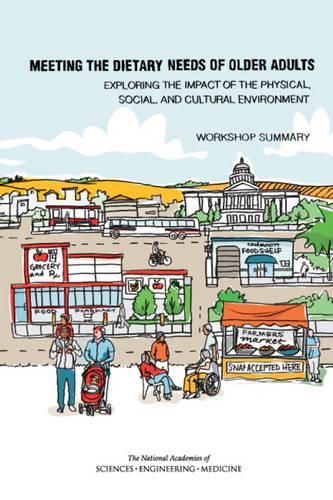Readings Newsletter
Become a Readings Member to make your shopping experience even easier.
Sign in or sign up for free!
You’re not far away from qualifying for FREE standard shipping within Australia
You’ve qualified for FREE standard shipping within Australia
The cart is loading…






Older adults are a growing demographic group in the United States, and a range of physical, social, financial, and cultural factors affect their nutritional status. Metabolic and physiologic changes that accompany normal aging modify the nutritional requirements of older adults. An examination of evidence is needed to better understand how nutritional status is associated with aging and risk of mortality or chronic disease among older adults. Underpinning many, if not most, nutritional problems in older adults is socioeconomic status. Therefore, understanding access challenges to healthy food, including geographic, financial, and transportation barriers, also is needed to better understand how to meet the nutritional needs of older adults.
On October 28-29, 2015, the Food and Nutrition Board convened a workshop, Meeting the Dietary Needs of Older Adults, in Washington, DC. Participants examined factors in the physical, social, and cultural environment that affect the ability of older adults to meet their daily dietary needs. This report summarizes the presentations and discussions from the workshop.
$9.00 standard shipping within Australia
FREE standard shipping within Australia for orders over $100.00
Express & International shipping calculated at checkout
Older adults are a growing demographic group in the United States, and a range of physical, social, financial, and cultural factors affect their nutritional status. Metabolic and physiologic changes that accompany normal aging modify the nutritional requirements of older adults. An examination of evidence is needed to better understand how nutritional status is associated with aging and risk of mortality or chronic disease among older adults. Underpinning many, if not most, nutritional problems in older adults is socioeconomic status. Therefore, understanding access challenges to healthy food, including geographic, financial, and transportation barriers, also is needed to better understand how to meet the nutritional needs of older adults.
On October 28-29, 2015, the Food and Nutrition Board convened a workshop, Meeting the Dietary Needs of Older Adults, in Washington, DC. Participants examined factors in the physical, social, and cultural environment that affect the ability of older adults to meet their daily dietary needs. This report summarizes the presentations and discussions from the workshop.